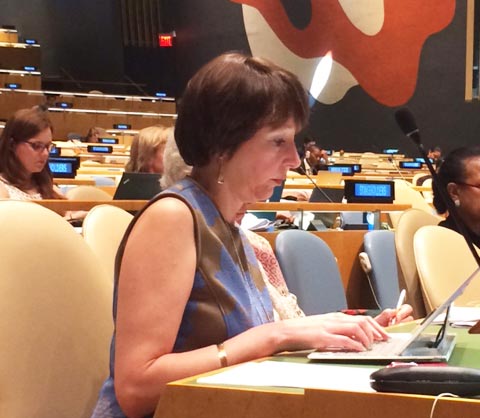World Milk Day 2024 Report – Celebrating Dairy’s Vital Role in Nutrition and Sustainability
This year, on June 1, we celebrated the vital role that dairy plays in delivering…

Here is a transcript of my statement.
Statement by Robynne Anderson of International Agri-Food Network (www.agrifood.net)
On behalf of the Business and Industry Major Group PGA Hearing on Post-2015 Monitoring
Wednesday, May 27, 2015
Good afternoon your excellencies,
I come from a family farm and am active in the agriculture sector, where as Director General of the International Agri-Food Network I co-ordinate the Private Sector Mechanism under the Committee for Food Security. I am honoured to speak on behalf of the Global Business Alliance on Post 2015 goals and the Business and Industry Major Group.
Of course, review and monitoring are essential to ensuring the achievement of these goals if we take the information gained to identify our gaps and refine our implementation efforts.
An important element of monitoring is to understand what we don’t know. We are aware that about 805 million people are suffering from chronic undernourishment. We are also aware that by 2050 the world’s population will reach 9.1 billion and that in order to feed them, the global food production must increase by 70 percent. This worrying issue raises many questions, including what if – in reality – many more people live in hunger and poverty?
A recent report published by the Development Progress project, has brought to light that 350 million people worldwide are not covered by household surveys. Taking this into account, there could be as many as a quarter more people living on less than $1.25 a day than current estimates suggest, because they have been missed out of surveys.
These people need decent jobs, the opportunities to create their own businesses, and can benefit from industrialization.
The private sector in all its forms – farms, small enterprises, family owned companies, national firms, and multinationals can contribute to achieving sustainable development goals. All of us in this multistakeholder session, are here to help achieve the goals.
I have had the good fortune to be engaged in the process from before the Rio+20 meetings. It is also my privilege to work with farmers, scientists, NGOs, and businesses in the coalitions we build and thus have worked with several major groups. Mr. Joshi made the point eloquently in his comments yesterday that all actors should be working together to achieve the Sustainable Development Goals.
We hope that countries and the UN system will be prepared to be inclusive. Calls to exclude business from this process, in other sessions, seem out of keeping with the role business plays in employing people, in creating infrastructure, and in capital. In fact, every aspect of doing business whether on a family farm or in a big corporation can contribute towards achieving the SDGs.
To make progress in implementation, we will need to have an open-minded and mutually respectful approach with the political space for partners to report on results and refine engagement, including at HLPF and thematic venues like the UN Committee on Food Security. We encourage there to be a separate track for private sector participation as there is at the FfD process.
We are all here to work together and we need methods to do this now and during the implementation process.
Public, private, domestic, and international investments are all needed to implement the goals – as are stable, efficient regulatory systems, anti-corruption regimes, and rule of law. We, literally, can’t afford to do this without each other.
Through the UN Global Compact and 1000s of standards, plus countless voluntary programs, businesses stand ready to take the SDGs on board. Many companies and associations already gather and report environment and sustainability information and we encourage an transparency and accountability framework that will emerge here to recognize and work in synergy with those established initiatives.
For instance, the extractives sector (which was originally supposed to speak today) asked me to observe that: for them measurement, reporting and verification (MRV) is a critical component it must be done in a manner that is efficient and effective. It must effectively work with existing reporting regimes in a way that does not unduly tax internal resources.
That will involve immediate work after September to do “coherence check” (to use a term from the FfD) to capture the goals. As noted, this morning we need science to do this.
We do believe the reporting of all sectors on their progress toward those commitments is the best way to garner momentum for the goals. Governments, businesses, philanthropists (as we heard from the Rockefeller Foundation yesterday) all need to report and last week we heard the representative of Liberia talk about the accountability for NGOs too. We are all in this together.
Businesses need and want the opportunity to make their contributions: from the provision of data, to the creation of jobs, from good environmental outcomes, and to better social equity. All this must be done in the context of the context of rule of law, peace and inclusiveness.